Student Success & The Northern Experience
Our two-year Construction Engineering Technician has been designed with a unique mixture of architectural, civil, structural and mechanical knowledge and skills for a career in construction and building management.
You’ll learn computerized drawing and detailing, surveying, methods and materials, specification writing, building code, residential and commercial estimating, engineering materials testing and mechanical installation.
Does this program sound like a good fit for you?
Connect with us to learn more.

Course Information
2024-2025 Academic Year
Semester 1
This course describes in detail the materials and construction techniques required for residential construction. Topics include sustainable design, soils and foundations, framing and the building envelope. Various options are discussed for each topic. Students will also use sketching and drafting techniques to complete various construction details.
84 Hours
In this course, students will learn essential skills for success in college and the workplace. This course focuses on developing and strengthening oral and written communication skills, and critical thinking ability. During this course, students will engage in a variety of forms of communication with a focus on upholding the principles of academic integrity. Students will develop the skills necessary to create discipline-specific documents, practice business etiquette and professionalism, and apply critical thinking strategies to practical scenarios. Upon successful completion of this course, students will be able to plan and draft concise, coherent and well-organized writing assignments that are tailored to specific audiences and purposes.
42 Hours
This course introduces the student to health and safety in their home, in society and within an occupational setting. Students learn about the social and personal benefits of safe work practices and the methods to best prevent accidents or injuries. Students will review the role, right and responsibilities of an individual in today’s health and safety conscious world. Students also learn how to read and interpret the Occupational Act and Regulations.
This is an introductory course designed to teach students the basics of using the AutoCAD drafting software to create 2 dimensional drawings. Lessons include using the draw, modify, layering and annotation commands.
56 Hours
This course covers basic algebra properties, graphing the straight line, basic geometry and trigonometry, and solving a system of equations graphically and algebraically. It also covers vector addition by components and by the cosine and sine laws.
56 Hours
This course is an introduction to the basic principles of Plane Surveying. The theory and use of theodolites/total stations, steel tapes and levels will be covered. Basic surveying calculations for direction, coordinates and area will be included.
42 Hours
Semester 2
Administration claims and disputes are a fact of life in the construction industry. Improper administration and legal disputes lead to disruptions and uncertainties affecting the ability of the contractor to carry on business. This course will assist the student to understand the duties, rights and responsibilities of a construction manager.
42 Hours
This course is designed to complement the Methods and Materials I/Detailing course at an Advanced level, and to prepare the students for the construction industry.
42 Hours
In this course, students will develop professional communication skills required for success in the workplace. Students will continue to develop and strengthen their oral and written communication skills and critical thinking abilities. During this course, students will use various modes of communication to complete assignments designed to meet program and professional expectations. Students will utilize a variety of technologies for the purpose of creating a professional presence in a digital environment. Students will develop the necessary skills to create polished workplace documents such as letters, resumes, cover letters and reports tailored to specific audiences. Students will learn to conduct themselves with professionalism in both workplace interviews and job searches. Upon successful completion of this course, students will be able to create clear, concise and coherent workplace and employment documents that are error-free and designed for specific audiences and purposes.
42 Hours
This course is primarily a laboratory course in concrete theory and soil mechanics. Ready mixed concrete is the most widely used construction material in the world. It is extremely versatile, strong, and economical in comparison to other materials. It lends itself well to a vast array of applications in construction. In addition, its attributes relative to sustainability are relevant to the entire construction industry. Concrete principles and theory constitute the first portion of this course.
The study of soil mechanics is important since soil is the most readily available construction material, and all structures must be supported on soil or rock. The student will learn the theory on which the most common laboratory and field tests are based, and perform related tests.
84 Hours
Improving your knowledge and understanding of the history of the Indigenous peoples of what we now call Canada is an important step to enable Indigenous and non-Indigenous people, organizations, and communities to work together more respectfully. Throughout this course you will have the opportunity to learn, discuss and reflect about many topics that are relevant in the learning journey towards reconciliation.
42 Hours
In this course, students will engage in a more applied approach to using Computer Drafting software. With a combination of theory and applicable practice, the student will learn the process of preparing Architectural, Civil and Structural Construction Drawings. Lessons will familiarize the students on Design Principles and procedures and prepare them to complete the term project
42 Hours
Municipal Engineering involves the study of Engineering Surveys, Construction Surveys, blueprint reading and the design and construction of municipal infrastructure. Emphasis will be placed on sustainable urban infrastructure design and construction practices.
28 Hours
Semester 3
Students are introduced to proper measurement techniques of construction items and components found in a commercial and municipal projects. Emphasis is placed on accuracy of measurement, quantity take-off concept, sound estimating principles, and construction materials. Appropriate software solutions will be applied.
56 Hours
Whether one is entering the field of building and construction management for the first time or is an established pro, there is always something new and exciting that can be learned from those in the industry. Construction Management II is a placement program that makes industry the classroom, and placement host the associate instructor.
84 Hours
Students review existing construction documents, research materials and techniques and gain knowledge on how to find information in both the graphical and written parts of a tendering set.
42 Hours
Plane Survey I is a continuation of Survey Principles. A “hands-on” project-oriented approach is emphasized, wherein survey principles are practiced in the field. Projects will include operating an automatic level to run a level loop and operating a total station to measure the distances and interior angles of a survey traverse. Emphasis will be placed on maintaining proper field notes.
42 Hours
General Education Courses are selected online each semester by the student from a list provided and exposes students to a related area of study outside of their immediate academic discipline. Certain programs have predetermined electives.
42 Hours
General Education Courses are selected online each semester by the student from a list provided and exposes students to a related area of study outside of their immediate academic discipline. Certain programs have predetermined electives.
42 Hours
Semester 4
This Project Documentation course has been designed to equip professionals in the construction industry with the essential knowledge and skills required for the effective creation, management, and utilization of project documentation. This course covers various critical aspects, including the process of tendering a construction project, an examination of the documents integral to a standard construction contract, and key elements of project planning and scheduling.
Throughout the course, students will gain practical insights into using the National Master Specification NMS, review the stipulated price contract outlined in CCDC2, understand the process of Contract Administration activities, understand Construction Tender procedures, apply Ontario specifications OPSS and OPSD for contract administration, utilize MS Project for creating construction project schedules, and using MS Excel for managing Construction Progress Payments and Project Forecasting.
Pre-requisites: AR1016 Methods and Materials I/Detailing
42 Hours
This course addresses the requirements of residential plans examination and code interpretation with reference to Part-9 of the Ontario Building Code. This program will give the students the basic level of knowledge and skills required to assist in the plans examination, design, and inspection of buildings constructed under Part-9 of the Ontario Building Code.
Pre-requisites: AR1016 Methods and Materials I/Detailing
84 Hours
The purposes of this course are to give beginning estimators an understanding of the fundamental principles of estimating, provide beginning estimators with practical experience, and to give beginning estimators a basic understanding of how to use spreadsheets to increase their estimating productivity and reduce errors.
Pre-requisites: AR2024 Estimating I
56 Hours
The course in Mechanical and Electrical Installations I introduces the student to basic Mechanical and Electrical Systems in the Commercial construction industry. In this course we will cover such topics as HVAC, piping, plumbing equipment and systems, Fire Protection, Introduction to Electricity, Communications, Life Safety, Security Systems, Electrical Design, Electrical Wiring, Lighting Design and Sustainable Design.
56 Hours
This course will cover such topics as: Measures of Central and Dispersion Tendencies; Distributions (Frequency, Probability, Binomial and Normal); Quality Process Control; Correlation and Regression Models and Hypothesis Testing. This course will have applications to various fields in engineering while using Microsoft Excel
Pre-requisites: MA1100 Mathematics I
42 Hours
Gain an understanding of GIS fundamental concepts and terminology including the role of GIS in business, government, surveying and natural resources. Learn how to create and manipulate data using GIS. Examine the collection, management, analysis and presentation of spatial data, concepts of database systems, data modeling and digital mapping.
42 Hours
Career Ready Graduates
Articulation Agreements
A number of articulation agreements have been negotiated with universities and other institutions across Canada, North America and internationally. These agreements are assessed, revised and updated on a regular basis. Please contact the program coordinator for specific details if you are interested in pursuing such an option.
Canadian Field of Study/CIP Code List
CIP Code: 15.1001
International students: check the Canadian Field of Study/CIP Code List to see if your program is eligible for the Post-Graduation Work Permit (PGWP).
- Develop and use strategies to enhance professional growth and ongoing learning in the construction engineering field.
- Comply with workplace health and safety practices and procedures in accordance with current legislation and regulations.
- Complete duties and assist in monitoring that work is performed in compliance with contractual obligations, applicable laws, standards, bylaws, codes and ethical practices in the construction engineering field.
- Carry out sustainable practices in accordance with contract documents, industry standards and environmental legislative requirements.
- Collaborate with the project team and communicate effectively with project stakeholders to support construction projects.
- Collect, process and interpret technical data to produce written and graphical project-related documents.
- Contribute to the collecting, interpreting and applying of survey/geomatics and layout information to implement construction projects.
- Identify and use industry-specific electronic and digital technologies to support the design and construction of projects.
- Contribute to the resolution of technical problems related to the design and implementation of construction projects by applying engineering concepts, basic technical mathematics and building science.
- Assist in the scheduling and monitoring of the progression of construction projects by applying principles of construction project management.
- Assist in the preparation of accurate estimates of time, cost, quality and quantity, tenders and bids.
- Perform quality control testing and monitoring of equipment, materials and methods involved in the implementation and completion of construction projects.
- Apply teamwork, leadership and interpersonal skills when working individually or within multidisciplinary teams to complete work on construction projects.
Career Opportunities
Students graduating from this program may find employment in construction management, contracting, estimating, sales, government services and consulting.
Explore labour market information for related careers and employment trend data from the Government of Canada Job Bank.
Admissions Information & Requirements
Program Specific Requirements
Admission Requirements
- Ontario Secondary School Diploma (OSSD)
- Grade 12 English (C, U)
- Grade 12 Math (C, U) (MCT4C preferred; MAP4C is accepted with a minimum GPA of 60%)
- Grade 12 Physics (C, U) recommended
Or equivalent
Academic prerequisites for this program may be obtained free of charge through Academic Upgrading.
Applicants who do not have a high school diploma or equivalent and will have reached the age of 19 years on or before the start of the program must undergo academic testing and may be required to complete Prior Learning Assessment & Recognition (PLAR) process to demonstrate equivalency of admission requirements prior to admission into a program.
For more details, please contact the Admissions Office at 705-235-7222 or admissions@northern.on.ca.
Additional Requirements for International Students
In addition to the admission requirements, international students must have proof of English Proficiency and meet the requirements below.
1. Proof of Senior High School Diploma/Certificate
2. English Proficiency (we will require one of the following):
- IELTS Academic International English Language Testing System a minimum overall score of 6.0 must be achieved with no individual band score under 6.0; however, we will accept one band at 5.5.
- TOEFL (Test of English as a Foreign Language) – Internet Based Test (iBT) overall minimum score of 79
- PTE (Pearson Test of English) Academic – Graduate Diploma: 58+
If your country of citizenship has English as its official language, we may accept alternate proof of English Proficiency.
All educational documents must be submitted in English and will be dependent on the country of citizenship.
For more information, please contact admissions@northern.on.ca.
Tuition, Fees & Payments
The tuition and fees information is typically updated yearly for the upcoming Academic Year in May. The amounts are for the full academic year.
Amounts may be based on last years tuition and fees and are subject to change.
If you are a current student, please refer to your Student Account or see a Student Services Clerk for the most up-to-date information.
Tuition
Domestic: $2,720.56
International: $15,257.86
Ancillary Fees
Ancillary fees vary by campus and support aspects of your experience as a Northern College student, such as Student Associations, Athletic Facilities, and Health Benefits.Ancillary fees are paid in full for the entire academic year in the first semester.
Please see Detailed Ancillary Fees for more information.
| Ancillary Fees by Campus (2024-25) | Domestic | International |
| Timmins (PC) | $945.50 | $1,558.00 |
Find Your True North.
At Northern College, you’re a part of a community.
From your teachers to support staff and administrators, we are all here to help you get an education and make some lasting connections along the way.
Your success is incredibly important to you, so we provide student supports to help you achieve your goals. From study assistance and accessibility services to mental health supports and financial aid, we’ve got you covered.
Each of Northern’s campuses boasts exercise facilities, a gym, cafeteria, study areas and a library – places that you can go to help keep you focused as you work your way through your studies. The communities we call home are incredible places, filled with amazing people and things to do.


Does Northern College sound like a good fit for you?
Here’s how to take your first steps on your new exciting and rewarding career path.
